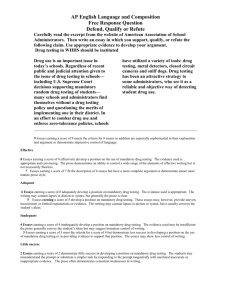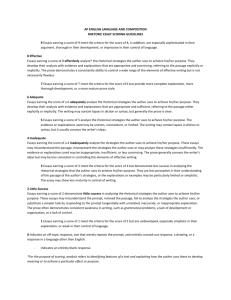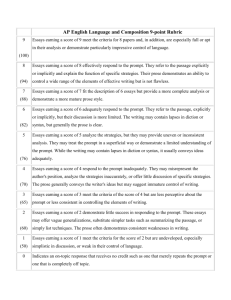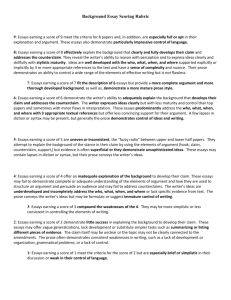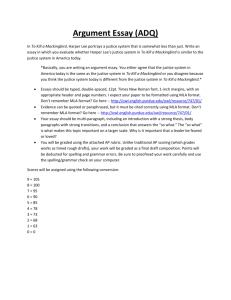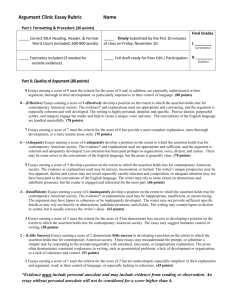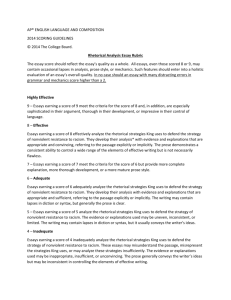Writing Rubric - Marlington Local Schools
advertisement
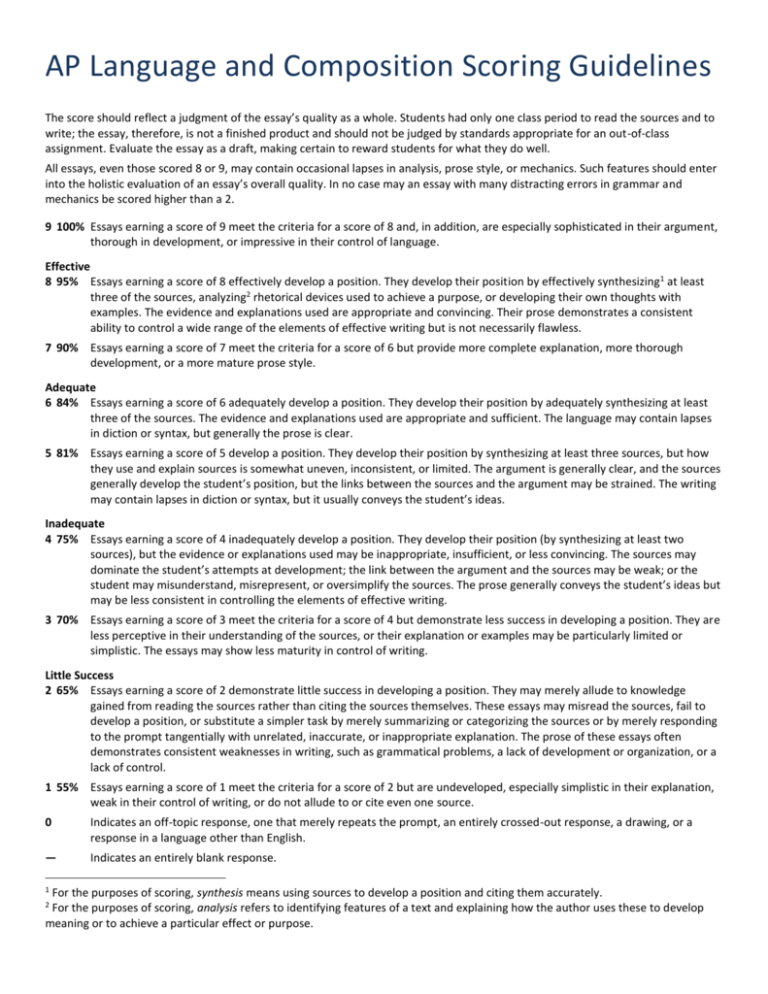
AP Language and Composition Scoring Guidelines The score should reflect a judgment of the essay’s quality as a whole. Students had only one class period to read the sources and to write; the essay, therefore, is not a finished product and should not be judged by standards appropriate for an out-of-class assignment. Evaluate the essay as a draft, making certain to reward students for what they do well. All essays, even those scored 8 or 9, may contain occasional lapses in analysis, prose style, or mechanics. Such features should enter into the holistic evaluation of an essay’s overall quality. In no case may an essay with many distracting errors in grammar and mechanics be scored higher than a 2. 9 100% Essays earning a score of 9 meet the criteria for a score of 8 and, in addition, are especially sophisticated in their argument, thorough in development, or impressive in their control of language. Effective 8 95% Essays earning a score of 8 effectively develop a position. They develop their position by effectively synthesizing1 at least three of the sources, analyzing2 rhetorical devices used to achieve a purpose, or developing their own thoughts with examples. The evidence and explanations used are appropriate and convincing. Their prose demonstrates a consistent ability to control a wide range of the elements of effective writing but is not necessarily flawless. 7 90% Essays earning a score of 7 meet the criteria for a score of 6 but provide more complete explanation, more thorough development, or a more mature prose style. Adequate 6 84% Essays earning a score of 6 adequately develop a position. They develop their position by adequately synthesizing at least three of the sources. The evidence and explanations used are appropriate and sufficient. The language may contain lapses in diction or syntax, but generally the prose is clear. 5 81% Essays earning a score of 5 develop a position. They develop their position by synthesizing at least three sources, but how they use and explain sources is somewhat uneven, inconsistent, or limited. The argument is generally clear, and the sources generally develop the student’s position, but the links between the sources and the argument may be strained. The writing may contain lapses in diction or syntax, but it usually conveys the student’s ideas. Inadequate 4 75% Essays earning a score of 4 inadequately develop a position. They develop their position (by synthesizing at least two sources), but the evidence or explanations used may be inappropriate, insufficient, or less convincing. The sources may dominate the student’s attempts at development; the link between the argument and the sources may be weak; or the student may misunderstand, misrepresent, or oversimplify the sources. The prose generally conveys the student’s ideas but may be less consistent in controlling the elements of effective writing. 3 70% Essays earning a score of 3 meet the criteria for a score of 4 but demonstrate less success in developing a position. They are less perceptive in their understanding of the sources, or their explanation or examples may be particularly limited or simplistic. The essays may show less maturity in control of writing. Little Success 2 65% Essays earning a score of 2 demonstrate little success in developing a position. They may merely allude to knowledge gained from reading the sources rather than citing the sources themselves. These essays may misread the sources, fail to develop a position, or substitute a simpler task by merely summarizing or categorizing the sources or by merely responding to the prompt tangentially with unrelated, inaccurate, or inappropriate explanation. The prose of these essays often demonstrates consistent weaknesses in writing, such as grammatical problems, a lack of development or organization, or a lack of control. 1 55% Essays earning a score of 1 meet the criteria for a score of 2 but are undeveloped, especially simplistic in their explanation, weak in their control of writing, or do not allude to or cite even one source. 0 Indicates an off-topic response, one that merely repeats the prompt, an entirely crossed-out response, a drawing, or a response in a language other than English. — Indicates an entirely blank response. 1 For the purposes of scoring, synthesis means using sources to develop a position and citing them accurately. For the purposes of scoring, analysis refers to identifying features of a text and explaining how the author uses these to develop meaning or to achieve a particular effect or purpose. 2


